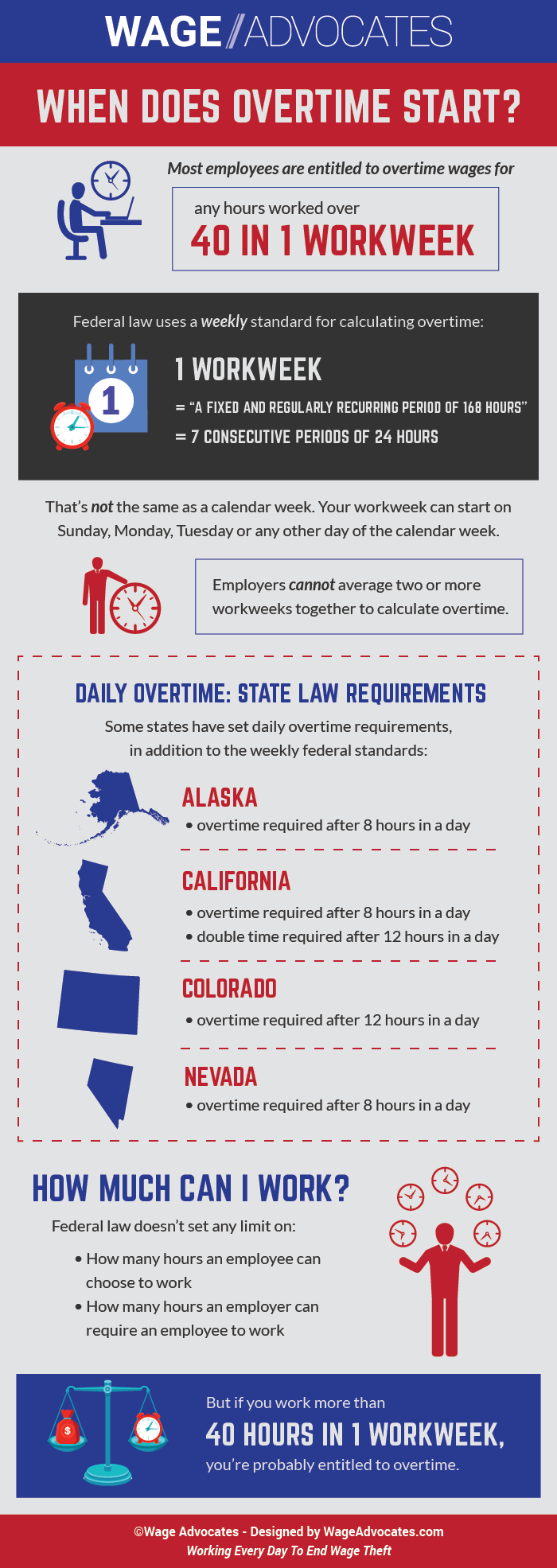When Does Overtime Start? [Infographic]
Most employees, except for those workers who are “exempt,” must be paid overtime wages for any and all hours worked over 40 hours in a single workweek. That’s federal law, established by the Fair Labor Standards Act all the way back in 1938, and it’s still true today.

Feel free to share our infographic on your own site. Just copy and paste the code below:
For federal law, a weekly standard is applied in overtime requirements. Some states, most notably California, have added additional requirements which make overtime pay mandatory on a daily basis, too.
When Is Overtime Pay Required?
The Fair Labor Standards Act is a federal law that establishes overtime requirements in the US. The Act covers most employers and, by the same token, the vast majority of employees. While not every worker is entitled to overtime wages by law, most people are.
Learn If You’re Entitled To Overtime Pay
For non-exempt workers, who are entitled to overtime, overtime wages must be paid for every hour worked over 40 in a workweek, according to the US Department of Labor. Overtime pay should be calculated as one-and-one-half times your regular rate of pay, which for some employees will include bonuses along with their normal rate of pay.
Federal law doesn’t set any limit on how many hours an employee can work in one workweek. You can choose to work as many hours as you want, and in most cases, your employer can require you to work as many hours as they want. But one thing is always true: if you work more than 40 hours in one workweek, and aren’t exempt from overtime pay, you should be paid extra for those additional hours.
What Is A Workweek Under Federal Law?
Federal law defines one workweek as “a fixed and regularly recurring period of 168 hours,” which is equal to seven consecutive periods of 24 hours. Obviously, that’s not quite the same as a calendar week, which starts on one Sunday and ends the next Sunday.
Lots of employees have workweeks that start on a Tuesday or Wednesday (or any other day of the week, for that matter), and some people’s workweeks start late at night. These differences are important when it comes to calculating overtime pay.
Overtime wages must be calculated based on an employee’s customary workweek. So if your week starts on a Tuesday at 10 pm, it should end the next Tuesday at 10 pm, making up a total span of 168 hours. If you work more than 40 hours during that time period, you should be paid overtime wages for the extra hours. This requirement is crucial, since many employers try to cheat the system by moving overtime hours to a separate workweek. People who work non-traditional hours or workweeks are most at risk for this type of labor abuse.
Can Workweeks Be Averaged Together?
No. Workweeks can’t be averaged together for the purposes of calculating overtime pay.

Companies often try to average two weeks worth of hours together to avoid paying their workers overtime. Let’s say you work 50 hours in one workweek, but only work 30 hours the next workweek. Your employer might try to average those two weeks together, by adding 50 hours to 30 hours, and then dividing the total 80 hours by 2 weeks. That comes out to 40 hours per week and, if you’d actually worked 40 hours each week, your employer wouldn’t need to pay you any overtime. But that’s not what you actually worked. The first week, you worked 50 hours and you have a legal right to overtime pay for the 10 overtime hours that you worked.
Averaging two work weeks together to calculate overtime pay is illegal. That’s true even if you get paid every two weeks.
Daily Overtime Pay Requirements
As we mentioned earlier, several states (and territories) have passed laws that require overtime to be paid based on a daily standard:
- Alaska – Overtime must be paid for any hours worked over 8 in a day
- California – Overtime must be paid for any hours worked over 8 in a day, and double time is mandatory for hours worked over 12 in a day
- Colorado – Overtime must be paid for any hours worked over 12 in a day
- Nevada – Overtime must be paid for any hours worked over 8 in a day
Puerto Rico is exceptional in many ways, not least of which are its labor laws. Overtime in Puerto Rico must be paid for any hours worked over 8 in a day. Double time is required for hours worked on a statutory rest day. On a weekly basis, workers in Puerto Rico are entitled to overtime for any hours worked over 40, but it has to be paid at double time, not time-and-a-half.
You can find an easy-to-use chart for these state overtime laws at the National Conference of State Legislatures.
Is Overtime Automatic For Work On Weekends Or Holidays?
No.
Federal law treats every day of the week the same. Saturdays and Sundays, along with holidays, are all treated equally for the purposes of overtime. There’s no federal requirement to pay workers extra for working on a weekend, unless the hours worked push an employee over the 40 hour threshold for overtime.
